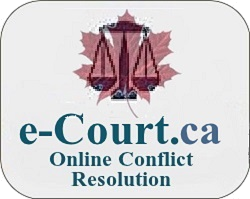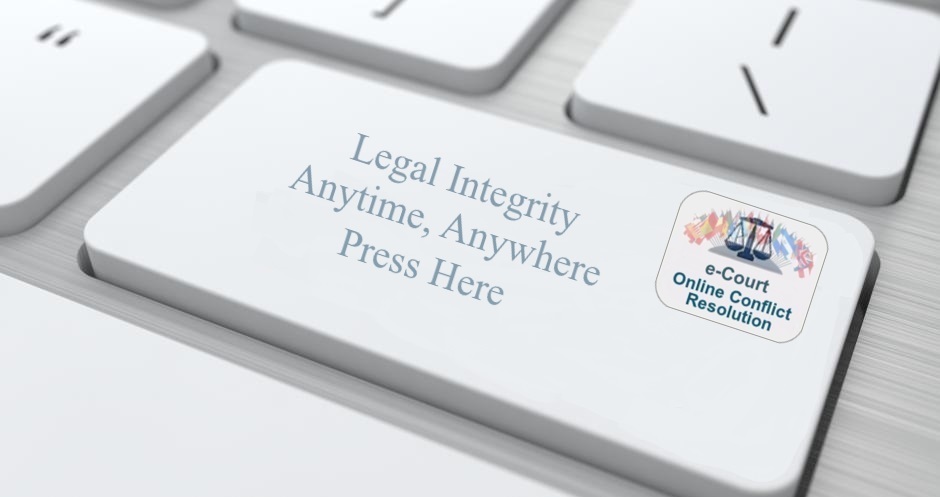Welcome Huibert, Canada member - ON / OFF-LINE MEDIATION, IT IS YOUR CHOICE


Dear Mr. Huibert Arnold,
 versus
versus 
Welcome to e-Court CanadaOnline ! Thank you for subscribing as a CA Mediation member with "Temporary" status. e-Court understands that there may "occasionally" exist situations where parties believe that an Offline mediation better suits and benefits the conflicting parties. Hence, e-Court does not impose the Online mediation method. As such the ultimate decision whether to choose On or Offline is left to e-Court's members. This said, e-Court does require all parties to irrevocably adhere to its general rules & principles, notably "Prior knowledge of Costs/Duration, Expediency" ( for info send email info@e-court.law ).
Our views re Online versus Ofline Mediation
As you already know Online Dispute Resolution (ODR) is a branch of dispute resolution or out of court settlement which uses technology and web as a medium through which disputes are resolved. As stated by its name, ODR has developed by merging Alternative Dispute Resolution (ADR) with Information and Communication Technology (ICT). It mostly consists of mediation, negotiation, client counselling, arbitration or any combination of either two or more of the mentioned disciplines. ODR can take place either partly or entirely online and it seeks to resolve both; the disputes arising in cyberspace and out of cyberspace. Being a modern take on ADR, usage of ODR has a lot of advantages, which are stated as follows:
(1) Cost-Effective Technique: When compared to litigation, ODR is extremely cost-effective as it cuts down on the hefty attorney fee that one has to pay to avail the court service. Also, as compared to traditional ADR, ODR is more cost-effective as it cuts down on the huge travelling expenses duringthe process of resolving disputes manually. The fee paid to reputed third-party for good services, is significantly cut-down as none of the parties need to be physically present in front of one another.
(2) Convenient Technique: ODR covers a wide range of geographical area. This guarantees good quality service to all the people of different regions. There is also an increase in choice of service providers in case of ODR, as various websites providing these services can seek to resolve a matter irrespective of the location of their head office. For example places like Bangalore, which has the very reputed Bangalore International Mediation, Arbitration and Conciliation Centre, has an advantage over other places lacking such infrastructure. However, through the means of ODR, the gap between various regions is bridged.
(3) Issue of Jurisdiction: The settlement which the disputed parties enter into is bound by an agreement, and the issue of jurisdiction of court can be easily avoided. This, in turn, saves time of the disputed parties.
(4) Time: Many state/ provincial and federal courts are backlogged and cannot hear cases as quickly as litigants would like. Mediations, on the other hand, can be scheduled at the convenience of the parties and the mediator. Thus, in certain situations such as divorce or employment disputes, many parties favor mediation over litigation.
(5) You Reserve the Right to Litigate: If you do not like the outcome of the mediation and you do not reach a mediation agreement then you can proceed to court.
However to every advantage, there is a disadvantage. ODR too has certain drawbacks as follows:
(1) Impersonal: ODR imposes electronic distance between the parties. There is no physical appearance of the dispute resolver. In other words, due to virtual process of ODR,the emotional state of the disputed parties and the resultant body language and tone are not expressed to the dispute resolver. This poses a hindrance to form any sort of personal relationship with the dispute resolver. Also, the dispute resolver has no control over the temper and tone of the disputed parties. In such a situation, the persuasive value of the resolver also significantly decreases.
(2) Knowledge of Computers: To avail ODR, the essential preliminary requirement is to have a basic sense of computers and operation of the internet. However, this becomes a problem in a country like India. Being a developing country, not a lot of people have access to computers. Even those who do, lack the trust required to avail ODR or any online services. Thus, there is not only ignorance pertaining to computers, but also the reluctance of the usage of them.
(3) Breach of Confidentiality: Often in the process of dispute resolution, a lot of confidential information regarding the parties themselves or the parties whom they represent is revealed. Confidential information is particularly more crucial in corporate negotiation in which often trade secrets are revealed. However, cyber space is prone to cyber crime. Hacking is on a rise. If not properly secured, confidential information can be easily leaked out, having a detrimental effect on the parties concerned.
(4) Limited Disputes: As a resultant of all these reasons, the disputes that come within the ambit of ODR are limited to an extent. For example, one of the most frequent disputes is that of a landlord and tenant. In such an agreement, there are a lot of intricate details involved including the frustration faced by the non-conformity of the landlord- tenant agreement. One would find it extremely tedious to convey all the points of dispute, their reasons for non-conformity and any kind of rebuttal in a complex matter through an online mode, and would prefer to resolve it by personal contact.
Despite these drawbacks, it is e-Court's prediction that ODR as presented by e-Court will soon rise to be the most popular method of dispute resolution. However, currently, ODR in many countries is still at its infancy stage. While there are websites which provide consultancy services, but there are several complicated disciplines like mediation, negation etc. that are yet to be popularised. With the growth of E-Commerce, it wouldn't be long that different websites such as e-Court.law come up with ODR suited to the global population, to resolve disputes in a faster and cost-saving manner.
We believe we recognized a real & timely need for online "Mediation, Arbitration, Legal Opinion & Counselling" services
( as alternative to often costly & lengthy traditional court procedures ). Together with our participating Mediators, Judges & Arbitrators & Counsellors our Directorate,
Supervisory Board, and Advisory Council as well as many ENDORSERS throughout Canada & around the world, we encourage you to connect with Linkedin page and Connection page and give us your endorsements. Thank you very much !

Huibert.H.W. Arnold
President & CEO of e-Court.us Legal Services International Inc
Ottawa, ONT. Canada
P.S If you have questions at "any" time please send us your email to : info@e-court.law






